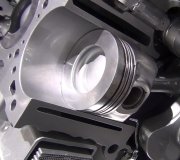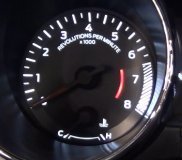I agree, something doesn't sound right, but I've been wrong too many times once I heard the mechanic's explanation.
There is indeed something related here. The oxygen sensor reports how much unburned oxygen there is in the exhaust. A crack in the intake manifold will let in too much air, therefore, the oxygen sensor will see that extra unburned oxygen. THAT is very uncommon and not something anyone would think to check for except when looking for the cause of a problem after all other things have been checked. A failed oxygen sensor is somewhat common so it makes sense that would be the likely suspect and the first thing that was replaced. Once they found that didn't fix the problem, they started looking for something unusual and that is when they diagnosed the cracked intake manifold. My hunch is the oxygen sensor wasn't needed, but I wasn't there and didn't see their test results. Normally the proper thing to do would be to reinstall your old oxygen sensor if it wasn't needed, but sometimes that is very difficult and time-consuming to replace, sometimes there is a known history of that part failing on that model, and they may know that with the age and mileage, it is about to fail, so they might elect to just leave it in there rather than risk it failing anyhow in a few months. Their thinking could be that you might be unhappy with the high cost of two related repairs, but you're going to be REALLY unhappy if that oxygen sensor fails in a few months and you have to come back again. Why put in a new one, put your old one back in, then put in a new one again months later and making you come back another time? YOU could be money ahead if they just leave that new sensor in place and move on to the next problem. That can take a long time to explain to customers, and all we often hear is "they diagnosed it wrong and charged me for the part". I ran into this often. Do you make the customer angry now and prevent a future problem, or do you make yourself look like the good guy and let that other part break down months from now and let them sit on the side of the road?
About 90 percent of the time, when coworkers brought me repair bills to look at, and I was able to get the repair history from friends who did the work, the diagnosis and repairs were legitimate but they did a real poor job of communicating the reasons to the customer. Mechanics are real good at analyzing car problems and talking them over with other mechanics. They are not good at explaining them to their service advisers. Service advisers are real good at talking with customers but they have to take information about your car that they don't fully understand and put it into language they hope you will understand. It's real easy to see why there is a big communication problem. Imagine if your doctor tried to explain his diagnosis to you in the same terms he used with another doctor. It's hard for mechanics to keep up with all the changes in new cars; it's no wonder owners don't know how complicated they are.
As for the cracked manifold, I think I'd get a second opinion as fixitmr suggested. It's awfully rare for one to crack. Two means something is causing it and that underlying cause must be corrected. It depends too on where that crack is located. Is it on one of the mounting flanges? I'd look for an overlooked piece of gasket or a warped mounting surface that is putting stress on the manifold. If it is cracked near a casting joint, it's possible there was a defect and it should be replaced under warranty. In that case many reputable shops will not charge you again for their labor. That is part of why they need to make a profit the first time, to help cover their costs if they have to do it a second time when it's not their fault. Some shops charge less but don't warranty their parts or labor as long.
$500.00 to weld the manifold suggests that includes labor to remove and reinstall it. It's most likely made from aluminum so they'll have to take it to a welding shop. Aluminum is very tricky to weld and requires special equipment. I would not expect there to be any warranty left on the part, but if the shop doesn't maintain a history of your car, you might remind them that this is the second time for this repair, and ask them why this uncommon failure happened a second time.
Monday, April 18th, 2011 AT 11:35 PM


